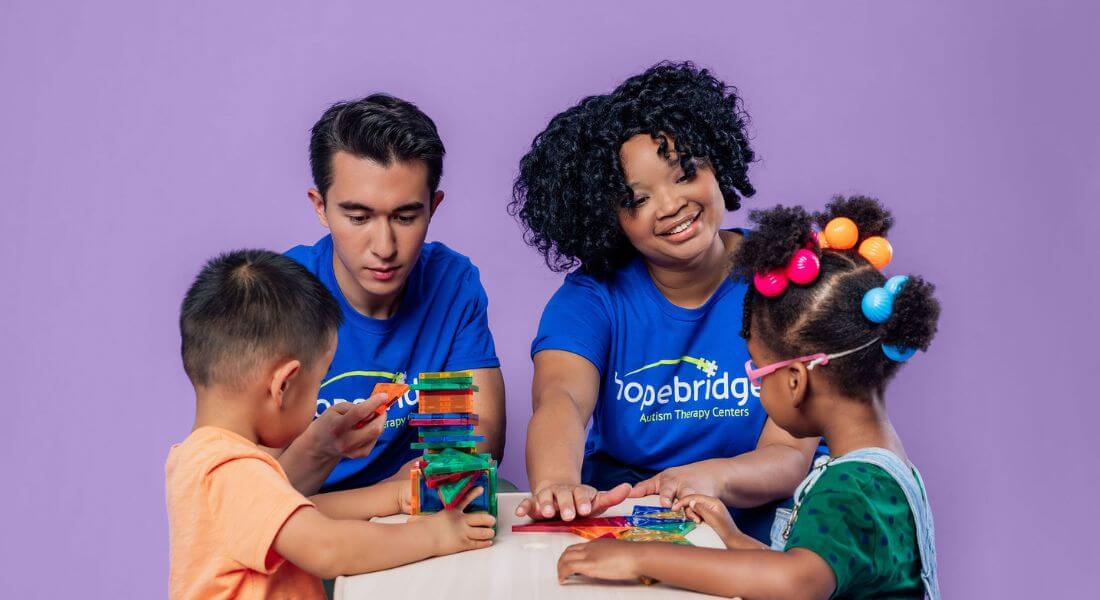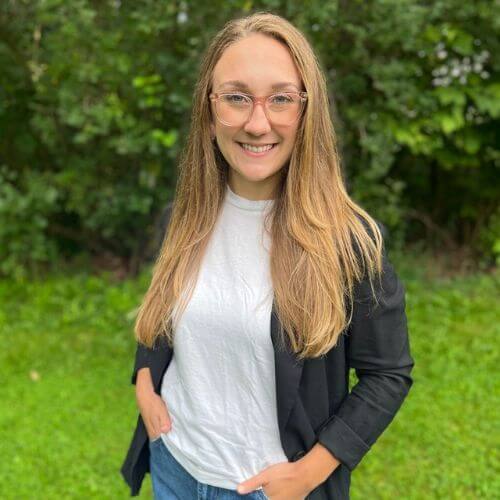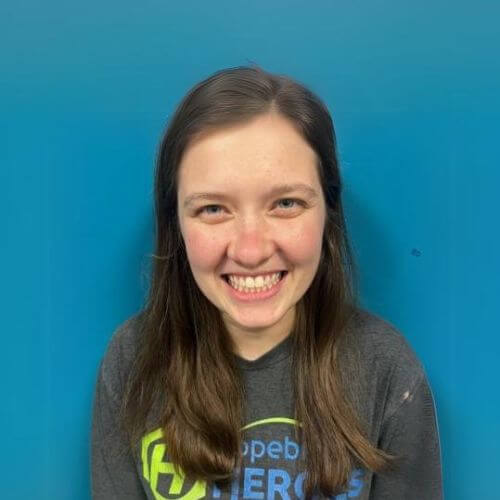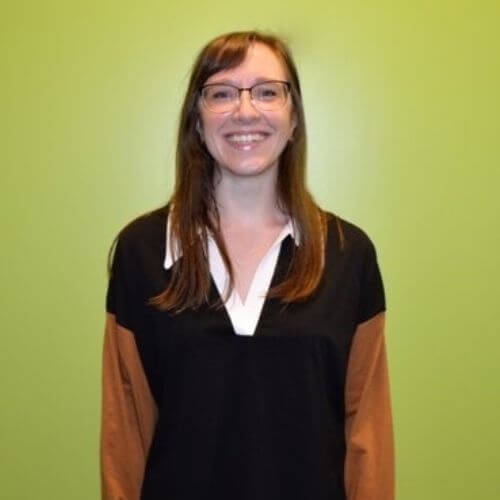Hopebridge Outpatient Therapies Mentorship Program Provides Occupational Therapists and Speech-Language Pathologists with Community and Skills Development
June 26, 2024
June 26, 2024

It’s an exciting moment when an occupational therapy practitioner or speech-language pathologist (SLP) passes their board exam and receives their certification. It may feel even more rewarding when that clinician accepts their first role with this title, or when they begin to lead their own caseload. But how does a clinician keep that passion and development alive once they have reached these initial goals? Building onto knowledge and skills should not end with schooling, but in these therapeutic areas, the paths for advancement are not always clear.
At Hopebridge, we always encourage our team members to strive for more, not only in their clinical practice, but also as they work to To further this effort, we created the Hopebridge Outpatient Therapies Mentorship Program, which is designed to support our occupational therapists, occupational therapy assistants (OTA) and speech-language pathologists at every stage of their careers. This initiative is tailored to build community, cultivate professional growth and enhance clinical excellence, offering a structured yet dynamic platform for our outpatient therapies team.

Abby Hamilton, MS, OTR/L, Outpatient Fieldwork and Professional Development Advisor
The Outpatient Therapies Mentorship Program kicked off at the start of 2024 to provide opportunities for OTs, OTAs and SLPs to develop in their roles both professionally and clinically.
“Our goal is to support clinicians no matter where they are at in their careers,” said Hopebridge Outpatient Fieldwork and Professional Development Advisory Abby Hamilton, who oversees the program. “The program leans heavily into creating meaningful career goals and building a professional development repertoire for those who participate.”
Currently, the program includes nearly 20 mentors, each leading a small group of mentees. These mentors facilitate monthly sessions that include reviewing relevant clinical or leadership topics through journals or lecture-style presentations. Additionally, team engagement activities are incorporated to help participants apply their newfound knowledge within a practical, collaborative setting.
“This structure allows mentors and mentees to engage deeply with clinical and leadership topics to promote a collaborative learning environment,” said Abby.
Since its inception, the mentorship program has covered an array of topics, beginning with an orientation session to outline the program and assign mentors. This initial meeting set the stage for a reciprocal learning environment where both mentors and mentees contribute to discussions and exchange ideas.
Following its launch, the program covered the importance of writing professional goals and setting a career trajectory.
“In many clinical settings, we hear that occupational therapists and speech pathologists wonder about their opportunities for advancement. This program encourages participants to put their dreams on paper and work towards them, whether that means pursuing an advanced certification or focusing on continuing education events in their areas of interest,” said Abby. “We want our clinicians to feel their jobs have meaning in their own lives, while also helping others.”
Other monthly topics have included diversity, equity and inclusion (DE&I), aiming to increase cultural awareness in therapy, as well as neurodiversity-affirming care, which is especially significant as a good portion of Hopebridge’s patient population has autism spectrum disorder (ASD).
Clinicians can expect their learning opportunities to expand even further now that Hopebridge has become an American Occupational Therapy Association (AOTA) Approved Provider. This designation opens up Hopebridge’s abilities to offer even more professional development activities and continuing education units (CEUs) for the mentorship program and other occupational therapists and occupational therapy assistants in the future.
In addition to deepening their knowledge across various topics through the monthly meetings, the mentorship program participants are also collaborating to develop an outpatient therapies resource library. The resource library will house valuable information therapists can refer to for state-by-state licensing requirements, costs, continuing education, helpful clinical resources and more.

Courtney Cowden, Lead Occupational Therapist
One of the Outpatient Therapies Mentorship Program’s standout features is its community-building aspect. Mentors and mentees alike have noted the value of the connections they formed as a result.
“This program allowed us to start connecting and learning with practitioners we might never have had the opportunity to be in the same space with otherwise,” said Registered Occupational Therapist (OTR) Courtney Cowden, one of the program’s mentors. “It makes a large company feel smaller and gives us names and faces to remember when we might be having a tough day.”
Hopebridge Speech-Language Pathologist Amanda Trent, also a mentor, echoes this sentiment. She appreciates the chance to develop leadership skills and promote self-reflection, knowing that it will ultimately help them improve the quality of care and comfort for Hopebridge’s patients.

Amanda Trent, Lead Speech-Language Pathologist Mentor
“The mentorship program gives us the opportunity to develop our skillsets together as a team, collaborate on a large scale across the company and build connections with colleagues across states. To me, the most valuable aspect is connecting with colleagues with various clinical experiences and expertise. We can ask questions, present complex cases, problem-solve and learn together in a safe space, which is something I haven’t seen in any other company I’ve worked for,” said Amanda.
Participation as a mentee is open to all clinicians upon being hired at Hopebridge. While not mandatory, clinicians are highly encouraged to join, regardless of how long they have been with the organization.
“Everyone is welcome to participate. It’s not just about the formal mentor-mentee relationship; it’s about building a supportive community where everyone can learn from each other,” said Abby.
The process of becoming a mentor within the program involves an annual application and interview process conducted in December to set the stage for the following year’s mentorship.
By creating a supportive community, providing structured and relevant learning opportunities, and encouraging the setting and achievement of professional goals, the Outpatient Therapies Mentorship Program is poised to make a lasting impact on its participants.
For occupational therapists and speech pathologists seeking to advance their careers, deepen their knowledge and develop their skills within a supportive and innovative environment, Hopebridge offers an unparalleled space for growth.
Check out the open positions available at Hopebridge to take the next step toward a fulfilling and impactful career. Together, we want to make your professional dreams a reality while also making a positive difference in the lives of the children and families we serve.
*Informed consent was obtained from the participants in this article. This information should not be captured and reused without express permission from Hopebridge, LLC.
Team Spotlight
December 06, 2022
How One Hopebridge Team Expands Care to Thousands of Families
Autism Therapy
October 02, 2020
Community Donations Spark Real-Life Learning Opportunities for Kids with Autism
Team Spotlight
August 30, 2022
Advocacy in Action: Hopebridge BCBA Kira Witte Builds Community Through Baseball
Team Spotlight
August 04, 2017
Catherine Meador – Get to Know Home Office’s Billing Intern